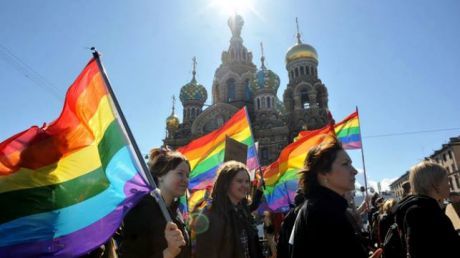Features
You are here
The Olympics and resistance

March 12, 2014
The Sochi Winter Olympic games have wrapped up now and the world’s attention has shifted elsewhere. When the Russian government passed its now infamous anti-gay laws, which criminalized “gay propaganda”, most of the world expressed anger and there were public calls for boycotts of the games. Many governments sent depleted contingents to the games’ opening ceremonies, with the Obama administration including legendary and openly gay tennis player Billie Jean King as an official representative for the US. There were even public statements from athletes and some sponsors condemning the laws.
Heading into Sochi there was also huge amount of criticism directed to the spectacle. The price tag for the event reached $50 billion, more than the combined costs of all previous Winter Olympics. Regular articles and news stories pointed out the tragedy of spending so much on the sporting event, when poverty and inequality ran rampant in Russia.
Silence during the games
Despite the anti-gay laws, however, most of the biggest sponsors kept quiet. Coca-Cola, the largest advertiser condemned the laws but did little to lobby the IOC or the Russian government to take a stand. In fact the IOC warned athletes about protesting. The audacity of the budget for the games was forgotten in the midst of the events. Vladimir Putin has successfully used the games to announce the return of Russia as a major world power and it is no accident that shortly after the games, his government has the confidence to engage in an imperialist adventure in the Ukraine.
After the games had started the once vocal opposition and media acknowledgments of the laws or the costs petered away. Small protests were cracked down on. Pussy Riot members were arrested and whipped by Cossack soldiers. When Vladimir Putin dropped by the Canada House in the Olympic Village, he was greeted like a celebrity. Athletes took pictures with the Russian President and the Canadian Olympic Committee chief Marcel Aubet heaped praise, stating “fantastic venues, fantastic atmosphere, and great Games, probably the best ever.” That Putin would begin rounding up protestors and opponents once the games were over doesn’t seem to really concern the likes of Aubet.
Olympics not political?
So what happened? Part of the problem is this idea that the world of sports and the Olympics is apolitical. The IOC’s charter waxes poetic language about opposing discrimination, but officials regularly speak out against athletes or officials who try to politicize the games. This of course is a fiction. Governments use the Olympics to ratchet up national chauvinism, whip up the patriotic furor, and get the country behind their national team. Countries have also used hosting the Olympics to announce to the world that they are now (or still are) geopolitical powers to be reckoned with. This was not only the case when Hitler’s Germany hosted the summer games in 1936, but continues to be a common theme. Beijing in 2008, London in 2012, Sochi this year, and the next summer games in Brazil are examples of the Olympics being used as strategic political events.
But try to introduce critical politics, like speaking out against racism, and the IOC cracks down, sometimes to the point of absurd. In Sochi, the IOC went so far as prohibiting freestyle skiers from wearing small decals on their helmets honouring the late Sarah Burke, insisting that it was a political statement. Unfortunately most Olympians, amateur athletes dependent on sponsorship and government funding, sometimes lack the confidence to speak out.
A history of resistance
This doesn’t mean that there haven’t been valiant acts of opposition that coincided with or were part of Olympic Games. The 1968 Olympics in Mexico saw mass protests that were crushed by the state as well as the famous black power salute by medalists John Carlos and Tommie Smith. Pro-Tibetan protestors made several successful attempts to extinguish the Olympic torch as it headed to Beijing prior to the 2008 Olympics. There were also significant protests raising issues of affordable housing during the Vancouver Olympics.
Even in Sochi, Canadian snowboarder Michal Lambert spoke out against the praise that the likes of Marcel Aubet were giving the games: ““A perfect Games isn’t someone who blows the budget through the roof for no reason, has people suffer, shuts people up. How is that a perfect Games? Spends ungodly amounts of money and then we are all going to watch it rot over the next 10 years.”
Most amazing, however, is the level of anger and protest that is engulfing Brazil as the country prepares to host the World Cup and Summer Olympics over the next two years. The government has invested billions to host these events, while insisting that workers accept austerity and low wages. Brazil is a country that loves sports but as radical sports writer Dave Zirin points out “This isn’t a movement against sports. It's against the use of sports as a neoliberal Trojan horse. It's a movement against sports as a cudgel of austerity.”
Olympic games tend to be a disaster for ordinary people whose countries host the events. Developers walk away rich, while everyone else pays the price. Hopefully Brazil and the history of resistance of protest at Olympic games will show that athletes and workers do not need to be silent. We don’t need to accept the neoliberal Trojan horse that the Games represent. Sports doesn’t need to be wrapped in a flag of chauvinism to be entertaining. We can offer an alternative that values athletics and sports but doesn’t come with weight of nationalism and austerity.
Join the discussion From the Sochi Olympics to the NFL: Capitalism, Sports and Resistance, Sunday March 30 in west Toronto.
Section:
Topics:









